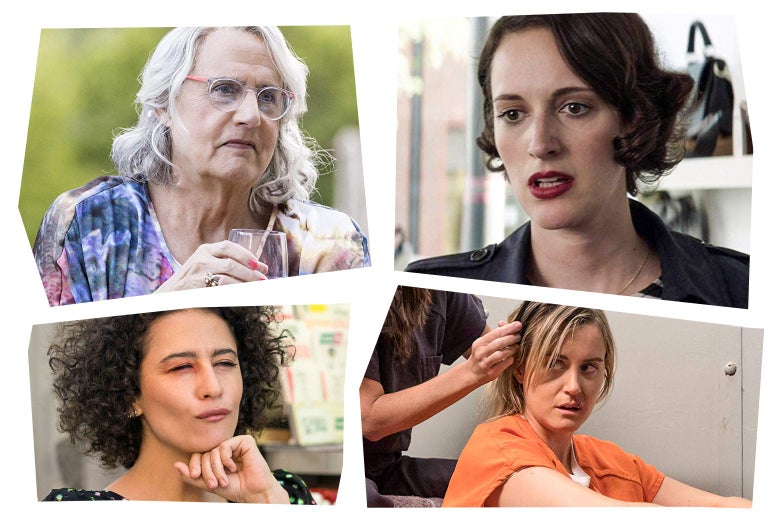
Photo illustration by Slate. Images by Amazon, Netflix, HBO, and Jon Pack/Comedy Central.
Sometime in the last couple of years, I began resisting calling TV shows feminist. The label seemed more often woolly than helpful—feminism means different things to different people, after all, and it felt much more productive to focus on how exactly a series explored female experiences than to pin (or withhold) a designation on a longform narrative often composed of disparate scenes and characters. Feminism had gone mainstream, which meant feminist TV had gone mainstream, and so it stopped making sense to use an adjective that could comfortably describe more shows than any one person could watch.
But the current near-ubiquity of sophisticated female representation on television makes it hard to remember that it’s a fairly recent development. Shows like Fleabag, Transparent, and Orange Is the New Black were a response to the golden age of male antihero-ism (which probably ended in 2015 with the Mad Men series finale), as well as a product of the then-nascent streaming wars, whose demand for a virtual infinitude of original programming led to some richly rewarded risks (also: Lilyhammer). Those shows—along with Broad City, Jane the Virgin, Crazy Ex-Girlfriend, Jessica Jones, and SMILF—made up a microgeneration of female-led shows that sealed TV as the medium for pop cultural feminist expression by introducing new depictions and sensibilities, often while stretching or simply making up genres. These shows also all ended in 2019.
It’s difficult to generalize about the series above, which span gross-out comedies, grief-stricken comedies, superhero tales, autobiographical riffs, meta-musicals, meta-telenovelas, and joke-studded takedowns of the prison-industrial complex. To be perfectly honest, a couple wore out their welcome several years ago (sorry, Transparent and Jessica Jones), while one demonstrated that putting women in charge isn’t a surefire solution to eradicating the kind of abuses of power that led to #MeToo. But as a group, these shows stood as a testament to the diversity of female stories, and their successes—measurable in buzz and awards, if not always in viewership numbers—proved, because it somehow had to be proven, that audiences are interested in stories about women.
For a medium as collaborative as television, where stories are spun in writers rooms, most of these shows also felt sui generis, specific to a single author’s vision. Some were loosely autobiographical, like Transparent and SMILF. Broad City gave its protagonists the names of its creator-stars, while endowing the show with a blend of the sweet and sticky all its own. Crazy Ex-Girlfriend was co-created by star Rachel Bloom and played to her interests in musical theater and more sensitive portrayals of mental illness. Fleabag was based on a one-woman play that creator and star Phoebe Waller-Bridge debuted in 2013. With 2019 near-casualty One Day at a Time, co-creator Gloria Calderon Kellett lent her own Cuban heritage to the Alvarez family.
Two one-season series that debuted and ended this year—the miniseries Unbelievable and the prematurely canceled Tuca and Bertie—also display sensibilities not found anywhere else on television. Even a more conventional series like The Deuce, which has David Simon’s languorous fingerprints all over it and James Franco as its Trojan Horse white male lead, looked for new ways to depict sex and sex work, introducing to non-industry audiences the key role of intimacy coordinators along the way. The effort is readily apparent on screen.
It’s probably a coincidence that all of these landmark female-led series are ending at the same time. There are predecessors, of course, that ended a few years earlier, like Girls and Inside Amy Schumer and Unbreakable Kimmy Schmidt, and there’s no shortage of feminist shows currently on the air—many with more intersectional ambitions, like Insecure, Shrill, Vida, Pen15, Work in Progress, Russian Doll, Undone, etc. But the collective ending of so many pioneering shows in one year can’t help but demarcate the end of an era when TV inspired audiences to say, Wow, I can’t believe this is on TV.
No matter how the streaming wars, the most disruptive force in television today, shapes the medium’s future, it seems safe to say that female-centric programming isn’t going anywhere anytime soon. There is cause to worry that the streaming wars will render TV safer, and thus duller—which for feminist shows might mean whiter, wealthier, straighter stories: a sea of Big Little Lies. But for now, let us mourn the end of an era when the stars aligned to give viewers grand experiment after grand experiment in women’s stories—a burst of creativity when networks were finally willing to give female tales more freedom and individual flair than they’d ever before.
from Slate Magazine https://ift.tt/34XcePz
via IFTTT
沒有留言:
張貼留言